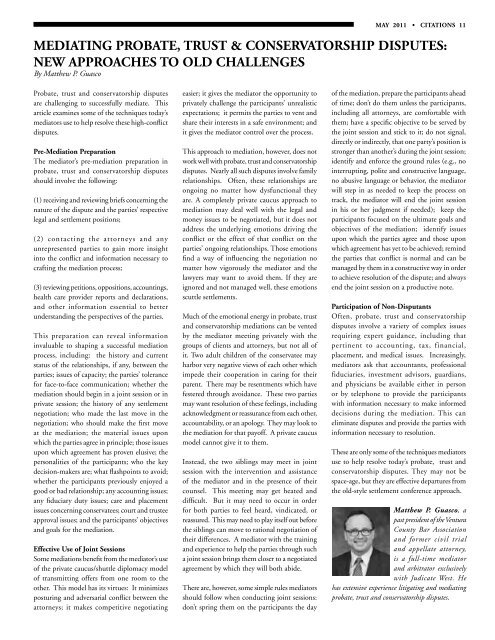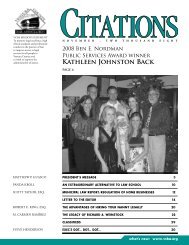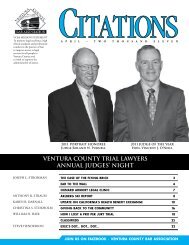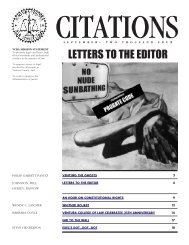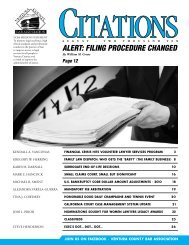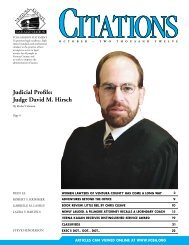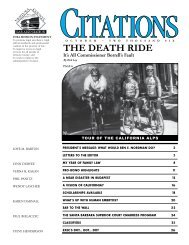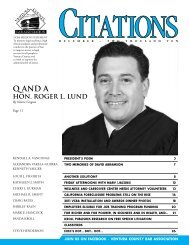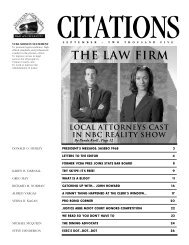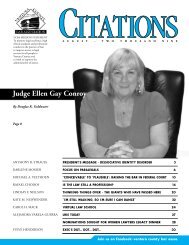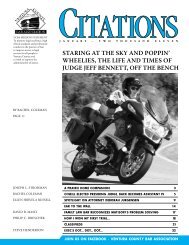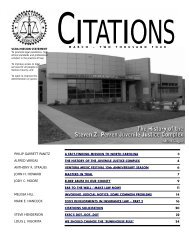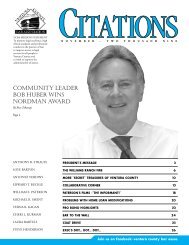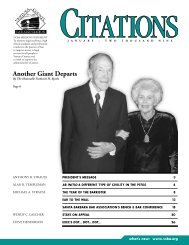May issue of CITATIONS - Ventura County Bar Association
May issue of CITATIONS - Ventura County Bar Association
May issue of CITATIONS - Ventura County Bar Association
You also want an ePaper? Increase the reach of your titles
YUMPU automatically turns print PDFs into web optimized ePapers that Google loves.
MAY 2011 • <strong>CITATIONS</strong> 11MEDIATING PROBATE, TRUST & CONSERVATORSHIP DISPUTES:NEW APPROACHES TO OLD CHALLENGESBy Matthew P. GuascoProbate, trust and conservatorship disputesare challenging to successfully mediate. Thisarticle examines some <strong>of</strong> the techniques today’smediators use to help resolve these high-conflictdisputes.Pre-Mediation PreparationThe mediator’s pre-mediation preparation inprobate, trust and conservatorship disputesshould involve the following:(1) receiving and reviewing briefs concerning thenature <strong>of</strong> the dispute and the parties’ respectivelegal and settlement positions;(2) contacting the attorneys and anyunrepresented parties to gain more insightinto the conflict and information necessary tocrafting the mediation process;(3) reviewing petitions, oppositions, accountings,health care provider reports and declarations,and other information essential to betterunderstanding the perspectives <strong>of</strong> the parties.This preparation can reveal informationinvaluable to shaping a successful mediationprocess, including: the history and currentstatus <strong>of</strong> the relationships, if any, between theparties; <strong>issue</strong>s <strong>of</strong> capacity; the parties’ tolerancefor face-to-face communication; whether themediation should begin in a joint session or inprivate session; the history <strong>of</strong> any settlementnegotiation; who made the last move in thenegotiation; who should make the first moveat the mediation; the material <strong>issue</strong>s uponwhich the parties agree in principle; those <strong>issue</strong>supon which agreement has proven elusive; thepersonalities <strong>of</strong> the participants; who the keydecision-makers are; what flashpoints to avoid;whether the participants previously enjoyed agood or bad relationship; any accounting <strong>issue</strong>s;any fiduciary duty <strong>issue</strong>s; care and placement<strong>issue</strong>s concerning conservatees; court and trusteeapproval <strong>issue</strong>s; and the participants’ objectivesand goals for the mediation.Effective Use <strong>of</strong> Joint SessionsSome mediations benefit from the mediator’s use<strong>of</strong> the private caucus/shuttle diplomacy model<strong>of</strong> transmitting <strong>of</strong>fers from one room to theother. This model has its virtues: It minimizesposturing and adversarial conflict between theattorneys; it makes competitive negotiatingeasier; it gives the mediator the opportunity toprivately challenge the participants’ unrealisticexpectations; it permits the parties to vent andshare their interests in a safe environment; andit gives the mediator control over the process.This approach to mediation, however, does notwork well with probate, trust and conservatorshipdisputes. Nearly all such disputes involve familyrelationships. Often, these relationships areongoing no matter how dysfunctional theyare. A completely private caucus approach tomediation may deal well with the legal andmoney <strong>issue</strong>s to be negotiated, but it does notaddress the underlying emotions driving theconflict or the effect <strong>of</strong> that conflict on theparties’ ongoing relationships. Those emotionsfind a way <strong>of</strong> influencing the negotiation nomatter how vigorously the mediator and thelawyers may want to avoid them. If they areignored and not managed well, these emotionsscuttle settlements.Much <strong>of</strong> the emotional energy in probate, trustand conservatorship mediations can be ventedby the mediator meeting privately with thegroups <strong>of</strong> clients and attorneys, but not all <strong>of</strong>it. Two adult children <strong>of</strong> the conservatee mayharbor very negative views <strong>of</strong> each other whichimpede their cooperation in caring for theirparent. There may be resentments which havefestered through avoidance. These two partiesmay want resolution <strong>of</strong> these feelings, includingacknowledgment or reassurance from each other,accountability, or an apology. They may look tothe mediation for that pay<strong>of</strong>f. A private caucusmodel cannot give it to them.Instead, the two siblings may meet in jointsession with the intervention and assistance<strong>of</strong> the mediator and in the presence <strong>of</strong> theircounsel. This meeting may get heated anddifficult. But it may need to occur in orderfor both parties to feel heard, vindicated, orreassured. This may need to play itself out beforethe siblings can move to rational negotiation <strong>of</strong>their differences. A mediator with the trainingand experience to help the parties through sucha joint session brings them closer to a negotiatedagreement by which they will both abide.There are, however, some simple rules mediatorsshould follow when conducting joint sessions:don’t spring them on the participants the day<strong>of</strong> the mediation, prepare the participants ahead<strong>of</strong> time; don’t do them unless the participants,including all attorneys, are comfortable withthem; have a specific objective to be served bythe joint session and stick to it; do not signal,directly or indirectly, that one party’s position isstronger than another’s during the joint session;identify and enforce the ground rules (e.g., nointerrupting, polite and constructive language,no abusive language or behavior, the mediatorwill step in as needed to keep the process ontrack, the mediator will end the joint sessionin his or her judgment if needed); keep theparticipants focused on the ultimate goals andobjectives <strong>of</strong> the mediation; identify <strong>issue</strong>supon which the parties agree and those uponwhich agreement has yet to be achieved; remindthe parties that conflict is normal and can bemanaged by them in a constructive way in orderto achieve resolution <strong>of</strong> the dispute; and alwaysend the joint session on a productive note.Participation <strong>of</strong> Non-DisputantsOften, probate, trust and conservatorshipdisputes involve a variety <strong>of</strong> complex <strong>issue</strong>srequiring expert guidance, including thatpertinent to accounting, tax, financial,placement, and medical <strong>issue</strong>s. Increasingly,mediators ask that accountants, pr<strong>of</strong>essionalfiduciaries, investment advisors, guardians,and physicians be available either in personor by telephone to provide the participantswith information necessary to make informeddecisions during the mediation. This caneliminate disputes and provide the parties withinformation necessary to resolution.These are only some <strong>of</strong> the techniques mediatorsuse to help resolve today’s probate, trust andconservatorship disputes. They may not bespace-age, but they are effective departures fromthe old-style settlement conference approach.Matthew P. Guasco, apast president <strong>of</strong> the <strong>Ventura</strong><strong>County</strong> <strong>Bar</strong> <strong>Association</strong>and former civil trialand appellate attorney,is a full-time mediatorand arbitrator exclusivelywith Judicate West. Hehas extensive experience litigating and mediatingprobate, trust and conservatorship disputes.


